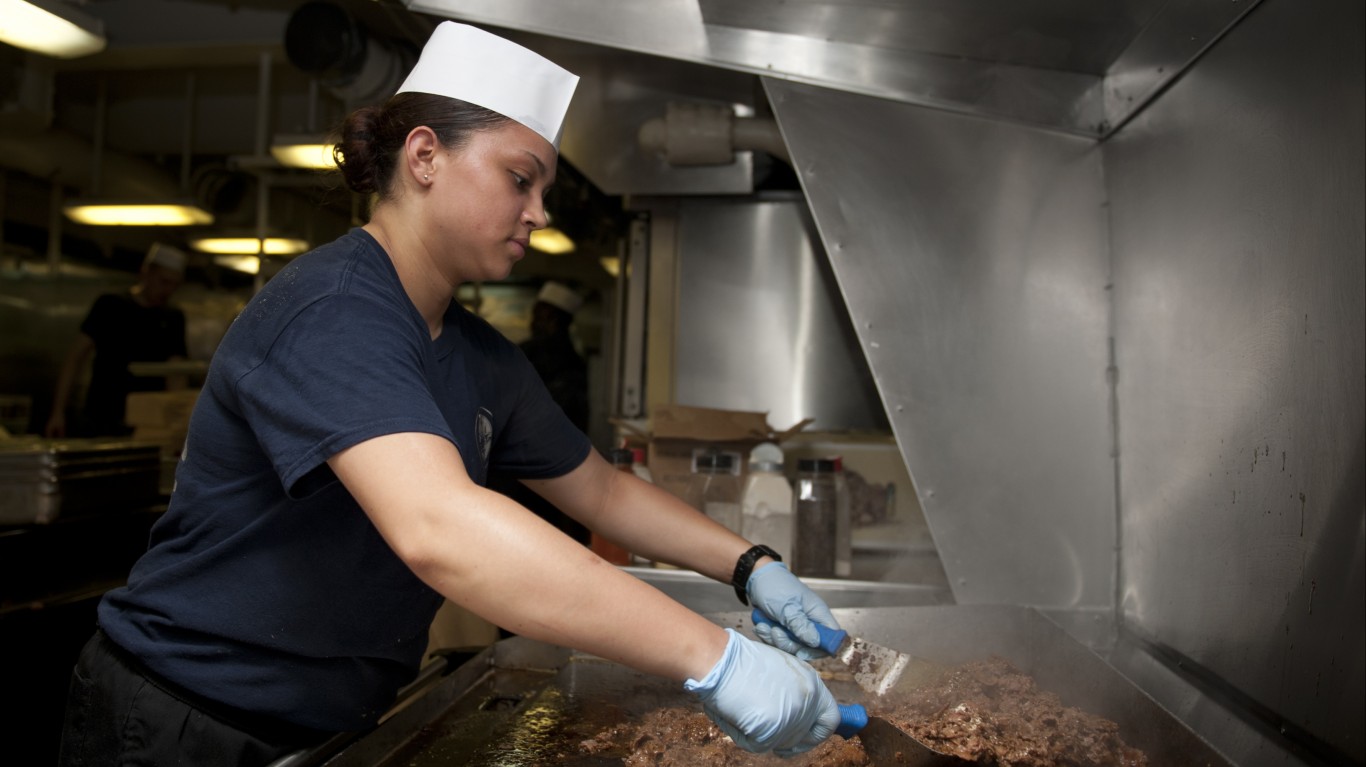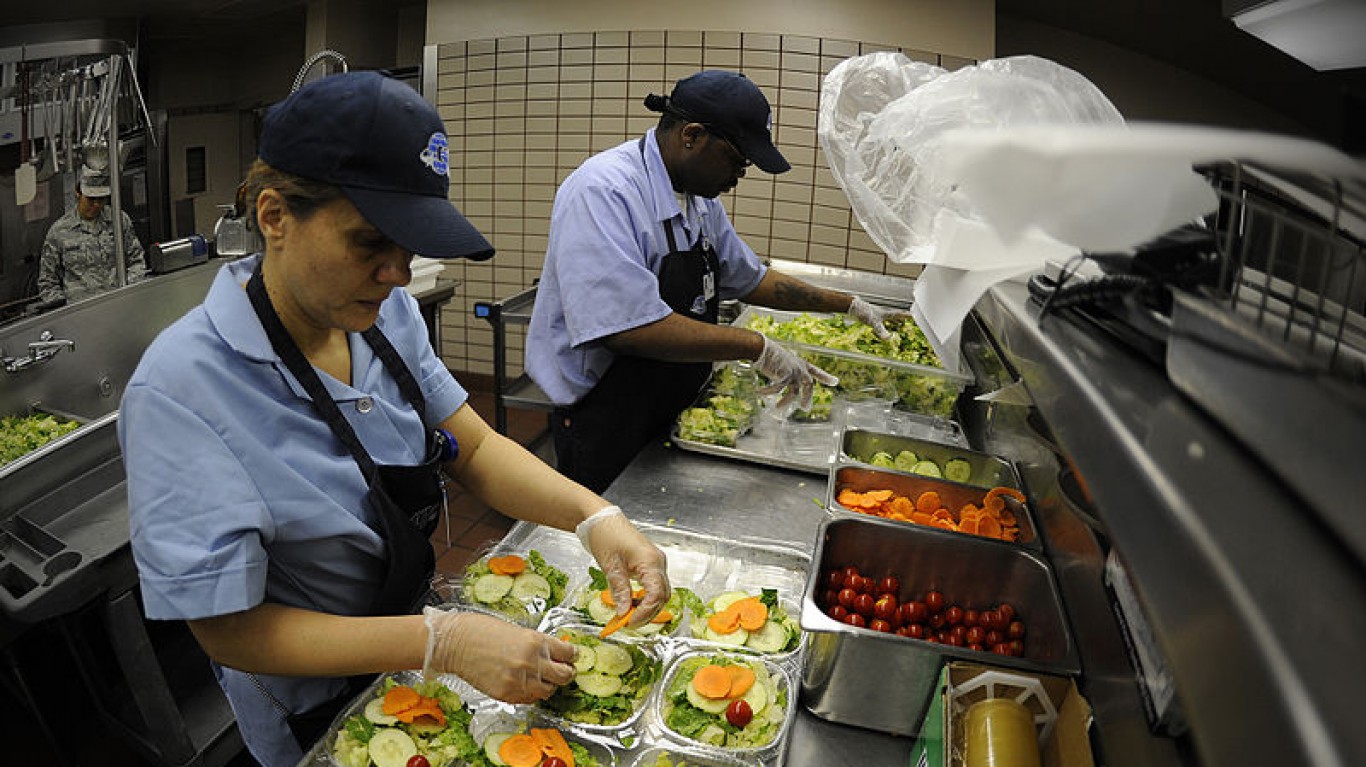
Many American workers struggled to make ends meet in 2020, as the COVID-19 pandemic reshaped the U.S. economy. About 22 million workers lost their jobs at the beginning of the pandemic, and by December 2020, there were still 10 million fewer jobs than before COVID-19 hit. The brunt of job losses fell on lower-income workers — they were more likely to have their hours cut or lose their jobs altogether compared to higher-income workers.
Nationwide, the median earnings across all jobs in 2020 was $984 per week, or $51,168 for the year. Yet there are dozens of jobs in which most workers earned weekly wages that translate to less than $32,000 that year.
To identify the lowest paying jobs in America 24/7 Wall St. reviewed data on median weekly wage for over 500 detailed occupations from the Bureau of Labor Statistics Current Population Survey program.
Many of the lowest paying jobs in America are in the service industry. These jobs have long paid relatively low wages as they typically do not require any kind of career experience or formal education. There is a strong correlation between education and income, and nearly all of the lowest paying jobs require little to no education, while the majority of the highest paying jobs in the country generally require at least a bachelor’s degree — though there are a few exceptions. These are the highest paying jobs you can get without a college degree.
Of the 25 lowest paying jobs, 17 have majority-female workforces. Women are often steered into lower-wage occupations like home health aides or child care workers because of factors like traditional gender roles and parental status. Women still tend to earn less money than men, even if they work the same job — even the 25 highest paying jobs for women still pay men more for the same work.
Click here to see the 25 lowest paying jobs in America.
Click here to see our detailed methodology.

24. Hairdressers, hairstylists, and cosmetologists (tied)
> Median annual earnings: $31,512
> Total number of workers, 2020: 205,000
> Projected employment change 2019-2029: -2.2%
> Hairdressers, hairstylists, and cosmetologists with a bachelor’s degree: 7.4%
Hairdressers, hairstylists, and cosmetologists work in one of the 25 lowest paying occupations in America, with workers earning a median annual wage of $31,512. The national median annual earnings for all occupations was nearly $20,000 higher for 2020, at $51,168. These workers have been some of the most severely impacted by COVID-19, as their work requires close contact and much of their wages comes from tips.
Even though male workers make up over 55% of the U.S. labor force, women make up the majority of the labor force in 17 of the 25 lowest paying jobs in the country. For instance, more than 88% of hairdressers, hairstylists, and cosmetologists are women.
[in-text-ad]

24. Shuttle drivers and chauffeurs (tied)
> Median annual earnings: $31,512
> Total number of workers, 2020: 57,000
> Projected employment change 2019-2029: N/A
> Shuttle drivers and chauffeurs with a bachelor’s degree: N/A
Most workers in the lowest paying jobs in America tend to be younger, in the beginning of their careers, before they had a chance to gain the educational or work experience needed to advance in their careers.
Yet shuttle drivers and chauffeurs tend to be among the oldest workers in the U.S. labor force, with a median age of 51.7 years old — nearly a decade older than the median age across all U.S. occupations of 42.5 years old. These drivers often work long hours, yet their median annual earnings are just over $31,500.

23. Landscaping and groundskeeping workers
> Median annual earnings: $31,460
> Total number of workers, 2020: 665,000
> Projected employment change 2019-2029: +10.1%
> Landscaping and groundskeeping workers with a bachelor’s degree: 7.9%
Like many people in the service industry, landscaping and groundskeeping workers are generally not well paid. Most of these workers earned less than $31,500 in 2020. Landscaping and groundskeeping is projected to be one of the fastest growing occupations in America over the next decade, with the number of jobs in 2029 projected to be over 10% higher than in 2019.
The growth is projected to be the result of the aging population. As more American homeowners age they may need help maintaining their lawns and gardens.

22. First-line supervisors of food preparation and serving workers
> Median annual earnings: $31,304
> Total number of workers, 2020: 335,000
> Projected employment change 2019-2029: +5.9%
> First-line supervisors of food preparation and serving workers with a bachelor’s degree: 14.9%
First-line supervisors of food preparation and serving workers are responsible for coordinating and supervising cooks, waiters, and other workers who prepare and serve food. Though this is a managerial role, workers in this position tend to earn relatively low wages, with a median annual earnings of $31,304.
Workers in the food service industry were among the hardest hit by the COVID-19 pandemic, as indoor dining was restricted or banned almost everywhere nationwide. An estimated 24% of people in food service and preparation occupations were unable to work because COVID-19 shut down their places of business.
[in-text-ad-2]

21. Bakers
> Median annual earnings: $30,992
> Total number of workers, 2020: 131,000
> Projected employment change 2019-2029: +5.3%
> Bakers with a bachelor’s degree: 12.5%
Bakers, who produce food items like breads and sweets, are in one of just 21 jobs in which most workers earn less than $31,000 annually. Though there is no formal educational requirement for becoming a baker, the occupation often requires long-term on-the-job training, as bakers hone their craft in dozens of different baked goods. It is the only job on this list that according to the BLS requires long-term on-the-job training.

20. Nursing assistants
> Median annual earnings: $30,940
> Total number of workers, 2020: 966,000
> Projected employment change 2019-2029: +7.6%
> Nursing assistants with a bachelor’s degree: 9.3%
Of the 25 lowest paying jobs in America, nursing assistant jobs are one of just two that typically require education beyond a high school diploma. Nursing assistants, who provide or help to provide basic care to patients, generally need a state-issued license to work after demonstrating their competency. Nursing assistant is one of the most commonly held jobs in the U.S., with nearly 1 million such workers, the majority of whom less than $31,000.
[in-text-ad]

19. Stockers and order fillers
> Median annual earnings: $30,836
> Total number of workers, 2020: 1,058,000
> Projected employment change 2019-2029: +0.7%
> Stockers and order fillers with a bachelor’s degree: 10.7%
Stockers place merchandise, materials, equipment, and other items on shelves, racks, tables, or elsewhere customers need them. These workers have median annual earnings of $30,836 — more than $20,000 lower than the U.S. median of $51,168 for all occupations. Stockers work one of just 20 occupations in America in which there were over 1 million workers in 2020. Stockers are needed at grocery and other retail stores, beer and liquor stores, and warehouses across the country.

18. Packers and packagers, hand
> Median annual earnings: $30,264
> Total number of workers, 2020: 436,000
> Projected employment change 2019-2029: -4.8%
> Packers and packagers, hand with a bachelor’s degree: 6.9%
There is little educational requirement or experience required to be a packer, and the occupation’s median earnings reflect the low skill level needed. Hand packers and packaging workers have median annual earnings of $30,264, lower than all but 17 other occupations in America.
Packing jobs are projected to drop by nearly 5% from 2019 to 2029 as automation increasingly replaces human workers in this field. In 2019, Amazon began using robots that can do the packing jobs held by thousands of workers.

17. Cleaners of vehicles and equipment
> Median annual earnings: $30,160
> Total number of workers, 2020: 214,000
> Projected employment change 2019-2029: +3.6%
> Cleaners of vehicles and equipment with a bachelor’s degree: 5.6%
The typical cleaner of vehicles and equipment earned $30,160 in 2020, $21,000 lower than the median annual earnings of all jobs in the U.S. for that year. The job, like many others on this list, has no formal educational requirement and does not require work experience in a related occupation.
These kinds of jobs that have no barrier to entry tend to pay relatively low wages, and workers in these jobs are generally earlier in their career. The median age of a vehicle and equipment cleaner is under 35, whereas the median age for all workers is 42.5 years.
[in-text-ad-2]

16. Sewing machine operators
> Median annual earnings: $30,108
> Total number of workers, 2020: 97,000
> Projected employment change 2019-2029: -9.3%
> Sewing machine operators with a bachelor’s degree: 6.8%
Sewing machine operators have a median annual earnings of about $30,100, lower than almost every other job in America. Jobs in this industry are likely going to be harder to come by in the near future. Sewing machine operator jobs are projected to decrease sharply, in part because many of these jobs are going overseas. The BLS projects the number of sewing machine operators will decline by over 9% from 2019 to 2029, even as employment across all jobs is projected to increase by around 4%.

15. Miscellaneous agricultural workers
> Median annual earnings: $29,848
> Total number of workers, 2020: 628,000
> Projected employment change 2019-2029: +1.1%
> Miscellaneous agricultural workers with a bachelor’s degree: N/A
Agriculture workers are in one of just 15 jobs in the U.S. in which most employees earn less than $30,000 per year. These workers operate farm equipment, work in nurseries and greenhouses, tend to livestock and other animals, and perform many other agriculture-related tasks.
As is the case with many lower paying jobs, agriculture workers are in a physically demanding occupation. They often work outside in all kinds of weather, performing repetitive physical tasks throughout the work day.
[in-text-ad]

14. Home health aides
> Median annual earnings: $28,548
> Total number of workers, 2020: 310,000
> Projected employment change 2019-2029: N/A
> Home health aides with a bachelor’s degree: N/A
Home health aides provide assistance with daily living activities to people with chronic conditions or disabilities in their residence. This is one of three health care support occupations to rank among the 25 lowest paying jobs in America, with a median annual earnings of just $28,548. Women in the U.S. tend to earn lower wages than men, and most of the lowest paying jobs in America skew heavily female. More than 91% of home health aides are women.
Home health aides and other workers in the personal care and service sector were among the most likely to have their hours and income affected by COVID-19. About 33% of workers in this sector reported being unable to work due to the pandemic as the job requires interpersonal contact, often with multiple older Americans throughout the day.

13. Personal care aides
> Median annual earnings: $28,236
> Total number of workers, 2020: 788,000
> Projected employment change 2019-2029: N/A
> Personal care aides with a bachelor’s degree: N/A
Personal care aides are some of the most common workers in the U.S., with over three-quarters of a million people in this job nationwide. This labor force is projected to get much larger over the next decade, as more baby boomers continue to reach old age and perhaps need help with daily activities.
Though many health care careers tend to pay high wages, health care support occupations, like personal care aides, are generally not well paid. These kinds of jobs generally do not require the same level of experience and education as doctors and nurses and therefore pay lower wages.

12. Laundry and dry-cleaning workers
> Median annual earnings: $27,976
> Total number of workers, 2020: 94,000
> Projected employment change 2019-2029: +0.2%
> Laundry and dry-cleaning workers with a bachelor’s degree: 5.5%
Laundromats have long been a way for new immigrants to the U.S. to start up their own businesses. But like many other service industry jobs on this list, laundry and dry-cleaning jobs are physically taxing, over long hours, and tend to pay relatively little. It is one of just 12 occupations in America in which most workers earn less than $28,000 per year.
[in-text-ad-2]

11. Childcare workers
> Median annual earnings: $27,924
> Total number of workers, 2020: 383,000
> Projected employment change 2019-2029: +1.7%
> Childcare workers with a bachelor’s degree: 20.2%
Though many Americans depend on child care services, childcare workers are among the lowest paid workers in the U.S. The median annual earnings for this occupation is just $27,924 — well below the median annual earnings for all occupations of $51,168.
Child care jobs have historically been staffed by almost all women, and more than 93% of workers in 2020 were women. These jobs have consistently paid lower wages than jobs that skew male. Female workers have historically been funneled into these kinds of jobs, which has perpetuated the wage gap between men and women working in America. As of 2020, BLS data shows that female earnings amounted to just 82.3% of male earnings in the U.S.

10. Hotel, motel, and resort desk clerks
> Median annual earnings: $27,768
> Total number of workers, 2020: 60,000
> Projected employment change 2019-2029: -6.9%
> Hotel, motel, and resort desk clerks with a bachelor’s degree: 19.3%
Desk clerks work in one of the 10 lowest paying jobs in America, with a median annual earnings of $27,768. Like in many other occupations on this list, desk clerks tend to be young, with a median age under 30. Many lower-paying jobs have young labor forces, providing entry-level occupations to workers who have yet to gain an education or work experience that would make them eligible for higher paying work.
Desk clerk jobs are projected to decline sharply, dipping by 6.9% from 2019 to 2029, even as the typical U.S. job is projected to grow by 4%. As more hotel, motel, and resort guests book their stays online, fewer desk clerks will be needed to set up their accommodations.
[in-text-ad]

9. Food servers, non-restaurant
> Median annual earnings: $27,612
> Total number of workers, 2020: 85,000
> Projected employment change 2019-2029: +6.8%
> Food servers, non-restaurant with a bachelor’s degree: 10.5%
Non-restaurant food servers deliver meals to people in places like hotels, hospitals, and residential care facilities. These workers are in one of eight jobs in the food preparation and service industry to rank among the 25 lowest-paying jobs. Just eight occupations have lower median annual wages than non-restaurant food servers, whose median annual wage is $27,612. The job generally has no formal educational or work experience requirements. These workers tend to be fairly young, with a median age of 33.1 years.

8. Dishwashers
> Median annual earnings: $27,456
> Total number of workers, 2020: 83,000
> Projected employment change 2019-2029: +0.5%
> Dishwashers with a bachelor’s degree: 5.5%
Dishwashers have median annual earnings of $27,456, a lower income than all but seven other jobs. Like many other jobs on this list, there is little to no barrier to entry for dishwashing jobs as it does not require any education. Among all dishwashers 25 and older, just 63.9% have a high school diploma, and 5.5% have a bachelor’s degree. For context, 92% of American workers 25 and over have at least a high school diploma, and 38.9% have at least a bachelor’s degree.

7. Waiters and waitresses
> Median annual earnings: $26,728
> Total number of workers, 2020: 600,000
> Projected employment change 2019-2029: +3.7%
> Waiters and waitresses with a bachelor’s degree: 16.2%
Waiting tables is one of the lowest paying jobs in America, with median annual earnings under $27,000 — one of just seven jobs in which this is the case. Waiters generally get most of their income from tips, an income stream that all but dried up during COVID-19. Nearly a quarter of food service workers, like waiters and waitresses, reported being unable to work due to the pandemic. Yet while cooks were able to keep their hours as restaurants transitioned to takeout and delivery models, wait staff were all but phased out.
[in-text-ad-2]

5. Cooks (tied)
> Median annual earnings: $26,520
> Total number of workers, 2020: 1,026,000
> Projected employment change 2019-2029: +10.0%
> Cooks with a bachelor’s degree: N/A
Cook is one of the most commonly held job titles in America, with over 1 million Americans cooking for a living. This job is projected to grow at more than twice the pace as the typical job over the next decade. As the U.S. population and incomes rise, the demand for restaurants is expected to increase as well. Cooks are typically not paid a high wage — the median annual earnings for someone in this job is $26,520.

5. Food preparation workers (tied)
> Median annual earnings: $26,520
> Total number of workers, 2020: 355,000
> Projected employment change 2019-2029: -1.1%
> Food preparation workers with a bachelor’s degree: 8.5%
Food preparation workers chop, wash, and otherwise prepare any food ingredients the cooks require. These workers tend to earn the same as cooks, however, with both jobs reporting a median annual earnings of $26,520. Of the jobs that have the 25 lowest median wages, food preparation jobs have the largest gender pay disparity. Women in this field have a median weekly earnings of $489 — less than 85% of the $876 median weekly earnings for male food preparation workers.
[in-text-ad]

4. Dining room and cafeteria attendants and bartender helpers
> Median annual earnings: $26,416
> Total number of workers, 2020: 99,000
> Projected employment change 2019-2029: +6.5%
> Dining room and cafeteria attendants and bartender helpers with a bachelor’s degree: 8.1%
Dining room and cafeteria attendants and bartender helpers perform a variety of duties in eating and drinking establishments, including cleaning and bussing tables, setting places, pouring water, serving patrons, getting supplies for cooks and bar tenders, and more. These types of jobs generally do not require any level of educational attainment or special training, so workers in this field are not well compensated, with most earning less than $26,500 per year.
Attendants and helpers were some of the most likely to be negatively affected by COVID-19 as many cafeterias and bars were shuttered throughout much of the pandemic.

3. Cashiers
> Median annual earnings: $26,364
> Total number of workers, 2020: 1,088,000
> Projected employment change 2019-2029: -7.4%
> Cashiers with a bachelor’s degree: 12.5%
Cashiers, who process payments for customers, work in one of the three lowest paying occupations in America. Cashiers earn a median annual wage of $26,364 — just over half as much as the U.S. median earnings for all jobs of $51,168.
Though cashier is one of the most commonly held jobs, with over 1 million in the U.S. labor force, that is projected to change quickly. Computers are rapidly replacing cashiers, as many businesses have introduced automated kiosks to take orders and payments from customers. As a result, there are projected to be 7.4% fewer cashiers in 2029 than there were in 2019.

2. Maids and housekeeping cleaners
> Median annual earnings: $26,156
> Total number of workers, 2020: 629,000
> Projected employment change 2019-2029: -0.3%
> Maids and housekeeping cleaners with a bachelor’s degree: 5.7%
Maids and housekeeping cleaners have the second lowest median annual earnings of any occupation, at $26,156. This is $25,000 lower than the median earnings across all U.S. occupations.
Many of the lowest paying jobs in America are held by young workers early on in their careers. Maids and housekeeping cleaners, however, have a median age of 46.5 years — four years older than the median age for all U.S. workers. There is a strong correlation between education and income, and maids have among the lowest educational attainment among all workers — just 65.1% have finished high school and fewer than 6% have at least a bachelor’s degree.
[in-text-ad-2]

1. Fast food and counter workers
> Median annual earnings: $24,336
> Total number of workers, 2020: 231,000
> Projected employment change 2019-2029: +11.4%
> Fast food and counter workers with a bachelor’s degree: 15.2%
Fast food and counter workers take orders and serve food at fast food establishments. These workers earn less than any other workers in America, with a median annual earnings of $24,366. No other occupation has a median below $26,000. These workers are among the youngest in the country, with a median age of 22.4 years — more than 20 years younger than the median age among all occupations.
Many fast food workers may be in their first jobs, as the occupation is one of the most widely available and does not require any special training or education. The number of fast food and counter workers is projected to grow by 11.4% from 2019 to 2029 — nearly three times faster than the typical job.
Methodology
To identify the lowest paying jobs in America, 24/7 Wall St. reviewed data on median weekly wage for 563 detailed occupations from the Bureau of Labor Statistics Current Population Survey program. Occupations were ranked based on median annual wage — the median weekly wage multiplied by 52 weeks — in 2020. Median earnings by gender and total employment by occupation also came from the BLS CPS. Data on projected employment change from 2019 to 2029, educational attainment by occupation in 2019, and typical education requirements by occupation came from the BLS Employment Projections program. Jobs sorted into miscellaneous categories were not considered. For some jobs, the BLS either did not collect data or opted not to publish data that did not meet the bureau’s collection criteria.
Are You Ahead, or Behind on Retirement? (sponsor)
If you’re one of the over 4 Million Americans set to retire this year, you may want to pay attention. Many people have worked their whole lives preparing to retire without ever knowing the answer to the most important question: are you ahead, or behind on your retirement goals?
Don’t make the same mistake. It’s an easy question to answer. A quick conversation with a financial advisor can help you unpack your savings, spending, and goals for your money. With SmartAsset’s free tool, you can connect with vetted financial advisors in minutes.
Why wait? Click here to get started today!
Thank you for reading! Have some feedback for us?
Contact the 24/7 Wall St. editorial team.
 24/7 Wall St.
24/7 Wall St. 24/7 Wall St.
24/7 Wall St. 24/7 Wall St.
24/7 Wall St.

